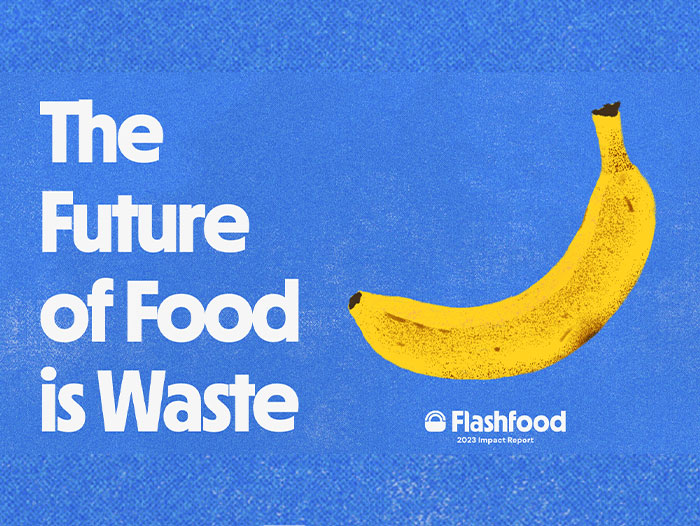Flashfood Releases 2023 Impact Report: The Future of Food is Waste
June 11, 2024 | 3 min to read
At the ReFED 2024 Food Waste Solutions Summit, Flashfood released its second annual Impact Report, emphasizing that the key issue is not food scarcity but food waste—approximately 145 billion meals are discarded annually in the US, while only 48 billion are needed to feed those facing food insecurity. The report advocates for a collaborative approach in combating this crisis, highlighting nutrition and affordable access to fresh produce as critical areas for intervention.

BALTIMORE — Flashfood released its second annual Impact Report: The Future of Food is Waste at the ReFED 2024 Food Waste Solutions Summit. The report features interviews with a variety of expert industry voices, a case study on SNAP EBT usage on Flashfood and a deep dive on how food waste relates to nutrition and produce consumption in the US.
The thesis of the report is clear: we don’t need more food in our food system, we need less waste. There
are 44 million people experiencing food insecurity in the US [1], but we’re throwing away the equivalent of 145 billion meals annually. We only need 48 billion meals to feed 44 million people 3 meals a day for an entire calendar year. We currently waste 3x what we need.
Excerpts from interviews with expert voices across the industry underline the report’s position that a
collaborative approach to solving this problem is the only option, with insights from Noreen Springstead,
President and CEO of Partnership for a Healthier America; Dana Gunders, Executive Director of ReFED;
and Ben Kuethe Oaks, Vice President of Customer Solutions and Success at Divert, Inc.
“There’s a tendency for technology companies in an emerging industry to be framed as competitors,
rather than collaborators,” said Nicholas Bertram, President and CEO of Flashfood. “The waste tech
space is critical to the future of this planet, so I think that’s irresponsible. Our people and our climate
depend on us to solve this problem. The aim of Flashfood’s annual impact report is not just to
communicate our progress, but to offer research and insights the industry can benefit from, and to
highlight other organizations we support. Through partnership I genuinely believe that the best days of
humanity are ahead of us, not behind us, and I hope the industry can join me in this optimism.”
Timely and Relevant: The Produce Crisis
Although inflation has slowed in the spring of 2024, people are still feeling the pressure. According to a
new survey of US consumers conducted by The Harris Poll on behalf of Flashfood [2] about half of
Americans (52%) are paying more attention to coupons or sales or buying store brand products over the
name brand (48%) as a result of rising grocery prices.
This has a nutrition cost. Eating healthily costs an additional $1.50 a day in the US [3] and the price of
produce has drastically outpaced the cost increase of other foods [4]. Today, fewer than 1 in 10 people in the US eat the recommended amount of fruit and vegetables [5]. At the same time, we’re throwing away over 30 million tons per year in the US. To address food waste and food insecurity in one go, throwing
away less produce is a great place to start. Flashfood is working to solve this problem with its number
one selling product: the mixed produce box. In 2023 alone, Flashfood saved shoppers more than $13
million dollars on fresh produce.
The second-annual report from Flashfood was produced and designed by COOMER, an B Corp certified
advertising agency based in Kentucky. To read the full report, visit Flashfood’s website.
About Flashfood:
Flashfood is on a mission to feed families, not landfills. The app marketplace connects shoppers with
fresh produce, meat and other groceries at up to 50% off. By partnering with retailers across North
America, Flashfood offers shoppers nutritious staples at affordable prices, and reduces the amount of
food going to landfills. Flashfood is a remote-first company currently partnered with more than 2,000
stores across 20 store banners, 21 states in the US and 10 provinces in Canada. For more information,
please visit www.flashfood.com.
[1] USDA
[2] This survey was conducted online within the United States by The Harris Poll on behalf of Flashfood from May 16 – 20, 2024 among 2,088 adults
ages 18 and older. The sampling precision of Harris online polls is measured by using a Bayesian credible interval. For this study, the sample data is
accurate to within +/- 2.5 percentage points using a 95% confidence level. For complete survey methodology, including weighting variables and
subgroup sample sizes, please contact press@flashfood.com.
[3] Partnership for Healthier America
[4] USDA, Economic Research Service using data from U.S Department of Labor, Bureau of Labor Statistics, Customer Expenditure Survey
[5] Partnership for Healthier America
